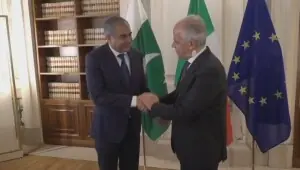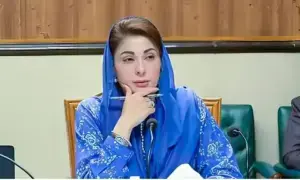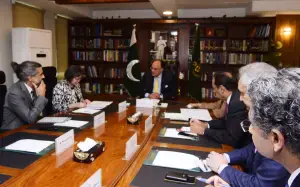IMF suggests Pakistan to impose 45% tax on agriculture income: report
4 min readThe International Monetary Fund (IMF) has proposed a 45 per cent tax on agriculture income as Pakistan negotiates a new bailout package with the global lender, The Express Tribune reported.
The English newspaper, while citing sources, reported that the Fund has set a structural benchmark that requires provincial governments in the country to amend their laws and impose a standard individual income tax rate of up to 45% on agriculture income.
Finance Minister Muhammad Aurangzeb also called for taxing agriculture and property, citing the system cannot function without such sectors contributing to the tax net.
This move is part of the lender’s efforts to reduce the disparity in the income tax regime in Pakistan, where the agriculture sector contributes a meagre 0.1% to the total tax collection despite accounting for 24% of the economy.
Under the Constitution, the federal government is prohibited from levying taxes on agricultural income, which falls under the domain of provincial authorities. But the IMF has found a way around this constraint by asking the provinces to simply adopt the 45% income tax rate applicable to non-salaried business individuals.
The global lender has set a deadline of October 2024 for the provincial governments to implement this change. It has also asked for the rescinding of any existing income tax exemptions for the livestock sector by October this year.
In a report, the World Bank estimated that Pakistan can potentially generate up to Rs1.22 trillion in tax revenue from the agriculture sector, amounting to 1% of the country’s Gross Domestic Product.
While the provincial governments have largely consented to the IMF’s demand, the Sindh government has expressed concerns that the 35-45% tax rate is too high compared to the existing 15% maximum rate in the province.
The IMF has also stipulated that any income tax exemptions for the livestock sector must be rescinded by the end of October this year. The global lender has also asked that the new agriculture income tax regime be implemented by January 2025, with the Federal Board of Revenue authorised to collect the taxes if the provinces are unable to do so.
The Punjab government has already given its consent to the new income tax regime for the agriculture sector, while the Sindh government is expected to eventually acquiesce to the IMF’s demands.
This proposed tax reform is a significant departure from the current system, where the provinces have varying income tax rates for the agriculture sector, with some exemptions applicable up to Rs4.8 million in annual income.
At a seminar earlier this week, President Asif Ali Zardari said that the federal government was planning to tax agricultural incomes as part of the conditions set by the IMF for a new bailout package.
The provincial governments would be taking the lead in this initiative, with a focus on taxing large landholding farmers based on their profitability and expenditures, he added.
Also, read this
Pakistan’s reliance on IMF to continue unless it boosts tax collection, warns Aurangzeb
Pakistan has met all requirements for IMF bailout deal, finance official says
But taxing the agriculture was not that easy.
While speaking about the agriculture sector, Bengali said that he was also of the view that agriculture should be further taxed but the data, available to him, showed that 80 per cent of farmers were small farmers who do not fall in the tax net. The rest are big landlords, which are in small numbers, he said.
“So the total number is very small. Even if you tax all of them fully, the total revenue will not be large. You will have tax, but the revenue will not be large because the number of taxpayers will not be large. The big landlords are not even 1,000,” he said while appearing on Spotlight with Munizae Jahangir aired on Aaj News on July 08.
He was of the view that the issue was about the government’s expenses, not more taxes.
“They [government] say that we will have to again go before the IMF after three years if they kept on doing this [increasing expenses] then they will have to go to IMF after one year,” he said, “the fundamental point is that the solution to fiscal crisis is not more taxes. It is more expenditure reduction.”
For the latest news, follow us on Twitter @Aaj_Urdu. We are also on Facebook, Instagram and YouTube.

























Comments are closed on this story.